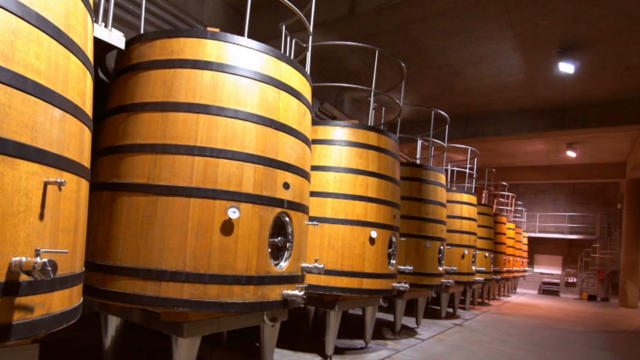Wine producers in Bulgaria are among the most eager groups awaiting Chinese Premier Li’s visit. The country has just over 7 million people, but a long history as an agricultural nation that exports its products worldwide. In 2016, Bulgaria sent over 5 million liters of wine to China. That number could double very soon.
CGTN’s Aljosa Milenkovic reports from the village of Kolarovo.
Cabernet Sauvignon, Merlot, Syrah and 14 other kinds of grapes grow in the endless field Bulgaria’s best vineyards. A few months from now, these berries will be ready to be harvested and will be used for their primary purpose.
Experts say the village of Kolarovo in Southern Bulgaria is the best location for winemaking. It’s the grapes from those vineyards that are turned into wine that then finds its way onto the tables of oenophiles in China.
At the Castra Rubra Winery, one of the best in Bulgaria, workers are proud of their craft, which is perhaps why the end product is slowly becoming a bestseller in markets across the globe.
“We work with 28 countries. We export mainly to China, USA and Japan,” according to Vladimira Kabakova. “I think the Chinese customers like wines who are typical for French, for the French type of producing wine. And because of that, we use a lot of the French techniques.”
A buyer from China, Zhang Changqing, doubled the exports of this Bulgarian wine in just one year: from 500,000 bottles to one million. He hopes that next year he’ll double that figure again, to two million bottles.
But during that process he faced the obstacle of promoting Bulgarian wine in a country where most of the people have hardly even heard about this small European nation.
“It is very difficult, because you know most of the Chinese, they don’t know Bulgarian wines,” he explained. “We have to make a lot of events, a lot of exhibitions, a lot of tasting parties, and promote Bulgarian wines.”
The country is producing almost 150 million liters of wine every year, and both Bulgarian wine producers, as well as authorities, are hoping to boost their wine exports to China.
They understand the potential of China’s growing appetite for wine, and hope that by offering very competitive prices and quality, they will be able to secure their position in the Chinese wine market.
 CGTN America
CGTN America
